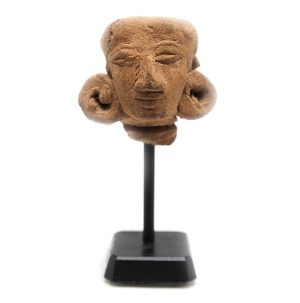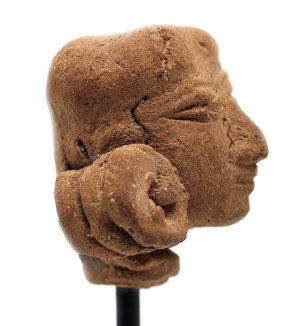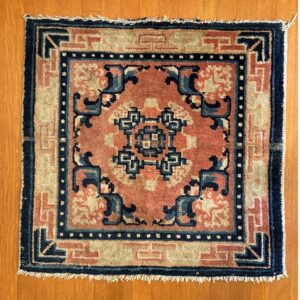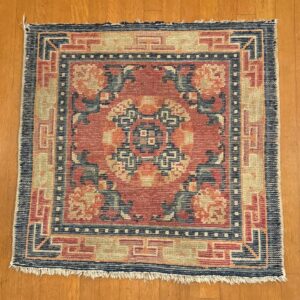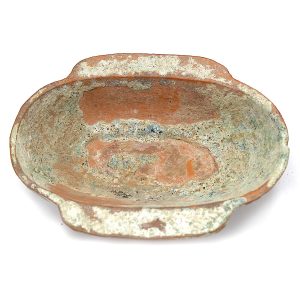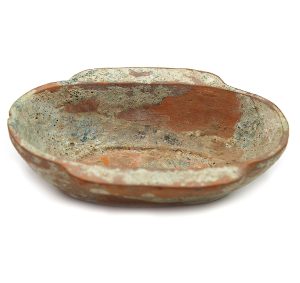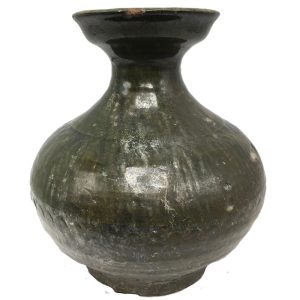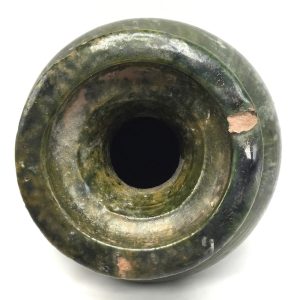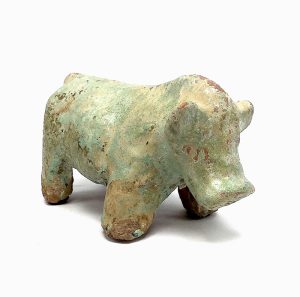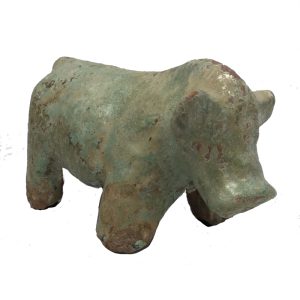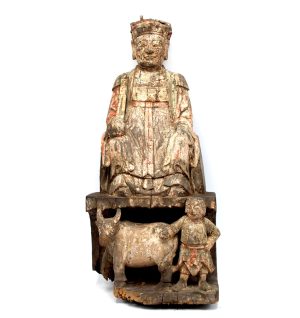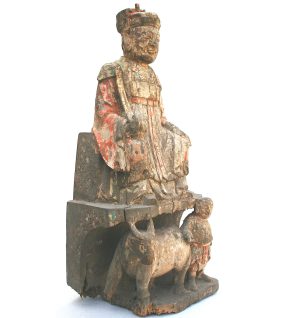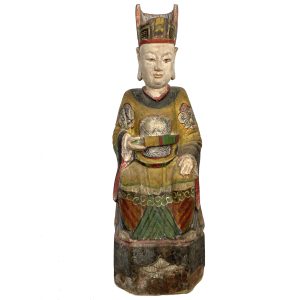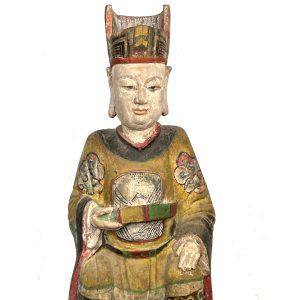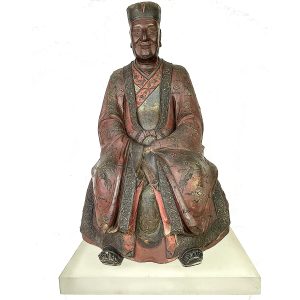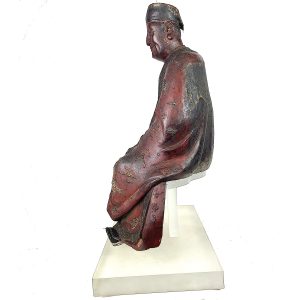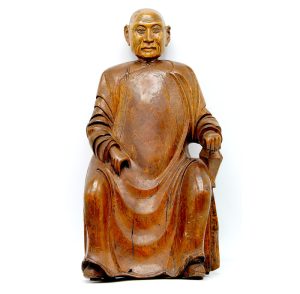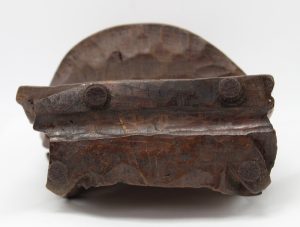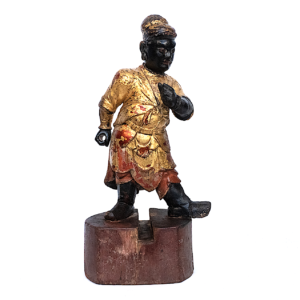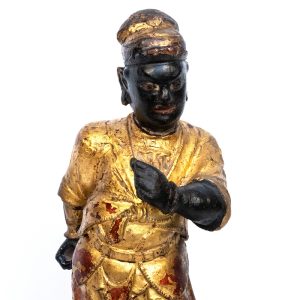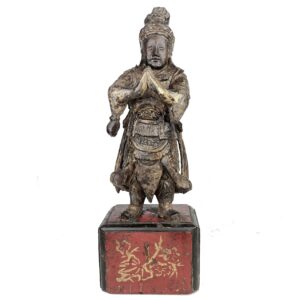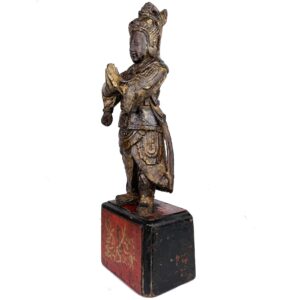Showing 1–12 of 313 results
-


$195.00
Ht: 2.75” W: 1.375” D:1.125” | FREE SHIPPING WITHIN CONTIMENTAL U.S.!
This terracotta head was crafted during the Majapahit Empire in Java and was either part of a bas-relief frieze or made as a freestanding figurine. Most figures found are small decapitated heads with no bodies, and it is very rare to find a complete figure with a naturalistic facial expression. As with many heads, this one displays Javanese facial features, hairstyles and ear ornamentation typical of the period. It has a naturalistic facial expression and wears large round coiled earrings, possibly suggesting it represented someone of the upper classes. It is in very good condition given its age and use and is mounted on a metal stand. This item pairs with Majapahit Miniature Terracotta 1138.
-


$375.00
This small vibrant carpet square with fringed edges can be used for meditation to sit on, an accent piece or hung on a wall. Made from wool and natural dyes, it has a cotton foundation and double weft with a medium wool pile and fine geometric designs. Meander designs and geometric motifs surround the center…
-


$450.00
Wing or ear cups (yushang), a term that describes its side flange-like additions to its ovoid body, appeared as early as the Zhou dynasty (1046-256 BCE) made in lacquer and later from a variety of materials. Lacquerware cups were used as dining vessels used for rituals and ceremonies contain fragrances, food or wine; and the…
-


$595.00
Hu vessels, first made in the Shang Dynasty is an ancient-pottery wine vessel whose body swells in the middle, flares into a narrow neck and often has a raised circular foot. Very popular during the Han dynasty, it was used as an ancestral tomb burial object (mingqi) to hold liquids and elixirs for the deceased…
-


$395.00
Mingqi are ancient earthenware pottery items usually made using a bivalve mould and covered with a lead glaze that fired to a dark green. The lead in the glaze often combined with tomb dampness for centuries creating a chemical reaction changing its coloring into a lustrous and iridescent green seen here. Han mingqi were ancestral…
-


$885.00
This extremely rare late Ming/early Qing dynasty antique-Chinese-wood-carving carving is divided in two parts and is significant for its juxtaposition of images as well as its unique iconography. The top is one of the Taoist officials in typical officials-attire: an official’s hat, a tiered robe with a red sash extending to the tops of the…
-
Sale!


$2,285.00 Original price was: $2,285.00.$1,700.00Current price is: $1,700.00.
H: 34″ W: 11.25″ D: 7.25″ | CALL 213-568-3030 OR EMAIL [email protected] FOR SHIPPING
Although this wonderfully carved antique figure portrays an ancestor depicted as an official, his atypically benevolent and finely modeled face makes him a very endearing figure. Old and weathering from age in its rear, this piece was repainted probably in the 20th century, as was periodically done with old figures with losses, especially due to seasonal South China climate. With his individualized convincing features, he is a very relatable rather than authoritarian figure, possibly resulting from the affection of the family that commissioned it. This beautiful and vibrant carving would enhance any setting.
-
Sale!


$650.00 Original price was: $650.00.$525.00Current price is: $525.00.
Artisans who were commissioned by family members to carve an ancestor figure they often emphasized positive personal features as well as their high status (or wish to enhance it). So, when they were placed on the family home altar with Buddhist, Taoist, Chinese Popular religious deities, they appeared more important and esteemed. This ancestor was…
-
Sale!


$4,950.00 Original price was: $4,950.00.$4,200.00Current price is: $4,200.00.
H: 23.5″ W: 15.625″ D: 10″ |CALL 213-568-3030 OR EMAIL [email protected] FOR SHIPPING COST
This exceptional Qing carving portrays a seated official ancestor wearing traditional official’s attire, a red and black official’s hat and black boots. His inset glass eyes and high cheekbones frame a large curved nose, a strong projecting chin and forehead wrinkles indicating a man of importance with the wisdom of age who demands respect. The top two robe layers have wide borders with marvelous raised lacquer decorations that include beautiful cloud forms, flying phoenixes with spread wings and floral sprays.
-


$785.00
H: 10.25” W: 5.125” D: 4” | FREE SHIPPING!
This very finely carved figure of an ancestor was commissioned by a family of either high status or wealth, having been carved from a single piece of an exquisite and rare hardwood with a lustrous patina. The exquisite carving in beautiful dense wood and patina make this a wonderful and distinctive piece.
-


$950.00
Guandi lived during the latter part of the Han Dynasty and is the best known and most revered Chinese military historical hero. He was canonized in 1504 as Guan Di, the Taoist God of War and China’s Protector. According to Keith Stevens, he is “all things to all men, not only prayed to for protection…
-
Sale!


$695.00 Original price was: $695.00.$395.00Current price is: $395.00.
H: 16.25: W: 5.875” D: 3.5” | FOR SHIPPING INFORMATION CONTACT US AT 213-568-3030
This fine woodcarving is Chou Ts’ang, the aide-de-camp and attendant to Guandi, the most revered and well-known military hero in Chinese history and the Taoist God of War. As an attendant his hands held together and eyes down cast in respect and legs firmly planted on the ground. His protective military clothing and heavy boots presented in detail and the high red and black pedestal with painted gold florals make him a key figure even though the figure of Guandi he attends would have been much larger and important.
End of content
End of content

